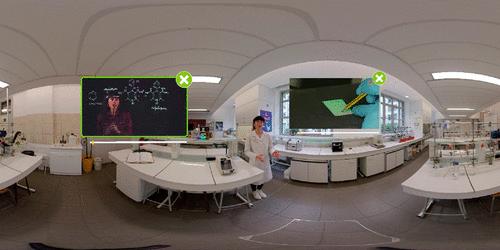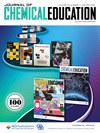Evaluation of the Use of a 360° Immersive Visit of the Organic Chemistry Practical Laboratory for Pharmacy Students
IF 2.5
3区 教育学
Q2 CHEMISTRY, MULTIDISCIPLINARY
引用次数: 0
Abstract
We report the implementation of a new pedagogical virtual tool within the Institut des Sciences Pharmaceutiques et Biologiques (ISPB) of Lyon for second-year pharmacy students. This tool provides a 360° immersive visit to the actual chemistry practical laboratory, allowing students to explore the room before attending the practical class in a video game-like fashion. The originality of this tool lies on the variety of pedagogical contents embedded in the 360° visit, such as 2D videos, lightboard videos, and animation videos. Evaluations of this immersive visit on learning, motivation, and autonomy of pharmacy students have been assessed by the students through online feedback. The positive results obtained demonstrated the usefulness of this tool in improving learning and motivation and fostering increased autonomy during practical classes. A more quantitative analysis was employed to examine the effect of watching the video before practical classes on the students’ autonomy level during the practical classes. The statistical test revealed a significant improvement in autonomy for students who watched the video before attending practical classes compared to those who did not. We hope this work will be beneficial to teaching researchers in pharmacy faculties seeking to bring innovation to their teaching methods.

对药学专业学生使用有机化学实践实验室 360° 沉浸式参观的评估
我们报告了里昂制药与生物科学学院(ISPB)为药学专业二年级学生实施的新型虚拟教学工具。该工具可让学生 360 度身临其境地参观实际的化学实践实验室,让学生在上实践课之前以类似视频游戏的方式探索实验室。该工具的独创性在于在 360° 参观中嵌入了各种教学内容,如二维视频、光板视频和动画视频。学生们通过在线反馈评估了这种沉浸式参观对药学专业学生的学习、积极性和自主性的影响。所获得的积极结果表明,这一工具在提高学习效果和积极性以及在实践课上促进自主性方面非常有用。我们采用了更多的定量分析来研究实践课前观看视频对学生在实践课上的自主水平的影响。统计检验显示,与未观看视频的学生相比,在实践课前观看视频的学生在自主性方面有明显提高。我们希望这项工作能对药学院寻求教学方法创新的教学研究人员有所帮助。
本文章由计算机程序翻译,如有差异,请以英文原文为准。
求助全文
约1分钟内获得全文
求助全文
来源期刊

Journal of Chemical Education
化学-化学综合
CiteScore
5.60
自引率
50.00%
发文量
465
审稿时长
6.5 months
期刊介绍:
The Journal of Chemical Education is the official journal of the Division of Chemical Education of the American Chemical Society, co-published with the American Chemical Society Publications Division. Launched in 1924, the Journal of Chemical Education is the world’s premier chemical education journal. The Journal publishes peer-reviewed articles and related information as a resource to those in the field of chemical education and to those institutions that serve them. JCE typically addresses chemical content, activities, laboratory experiments, instructional methods, and pedagogies. The Journal serves as a means of communication among people across the world who are interested in the teaching and learning of chemistry. This includes instructors of chemistry from middle school through graduate school, professional staff who support these teaching activities, as well as some scientists in commerce, industry, and government.
 求助内容:
求助内容: 应助结果提醒方式:
应助结果提醒方式:


